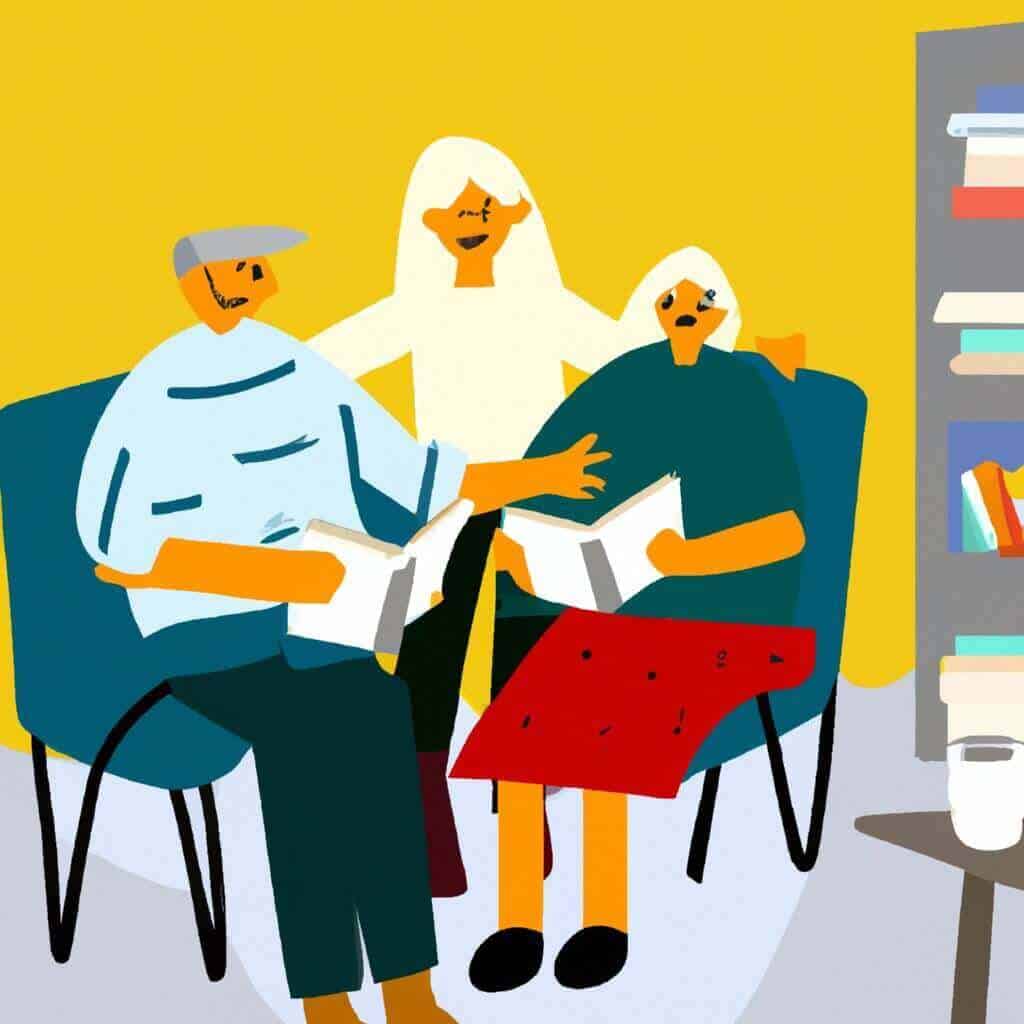Bibliotherapy uses books to help people resolve or manage their issues. It can be used as a form of counselling, leisure, or to help people learn new things. Most people think of bibliotherapy as a type of therapy that uses books to help people deal with emotional problems. However, you can also use bibliotherapy to promote leisure and relaxation. So bibliotherapy may be perfect for you if you’re struggling with personal issues, need support during difficult times, or want to improve your leisure lifestyle.
How Is Bibliotherapy Used?
Stories and images within books can help increase positive moods and depression levels, providing an escape from the stresses of everyday life. Some common techniques include reading aloud in a group or a book club and reflecting on individual thoughts about the topic. This technique must be non-judgemental and supportive, ultimately reflecting positivity and acceptance. Reading books can allow individuals to reflect on their life journey in a new way, thus developing a deeper understanding, self-awareness and self-respect.
Bibliotherapy is also used as an adjunct to other interventions, such as talk therapy or as a standalone intervention. Of course, many people who do not have an issue read fiction and non-fiction books, and in doing so, may not realize that they are helping themselves with many issues. For example, books have long been known to provide mental health benefits, but few people are aware of the many unique benefits that bibliotherapy can offer. When used correctly, books can help people reflect on their thoughts and feelings, escape from reality, and develop essential life skills. Bibliotherapy has even been recommended for pregnant women due to the benefits, which include:
- Increased creativity: The process of reading can help stimulate the imagination and lead to positive life changes. Reading can increase your vocabulary, critical thinking skills and literacy levels, making you more competent in every way possible.
- Better coordination: You may wonder how reading improves coordination. Well, holding the book and turning the pages requires fine motor skills, and if you have shaky hands, the focus needed to turn the page will increase your muscle strength, thus improving your trembling hands and giving you better coordination. In addition, you require your eyes to move along the page with the words, increasing your coordination when pursuing other leisure activities such as painting, hitting a baseball, or even driving. Remember when your coach or parent told you to keep your eye on the ball and then swing? Well, this is coordination and developing the ability to follow words in a book increases your focus on an item.
- Increased concentration: By reading regularly, you are strengthening your concentration skills, which will benefit you in other areas of your life when you concentrate on getting a task done, whether work or leisure related.
- Boosts your immune system and decreases stress: Reading a physical book has more benefits than reading a book online. Touching the book and turning the pages engages you more deeply in the content. You engage fully, body and mind, and the result is increased strength in your immune system, according to Neurology.org, which will also help decrease the likelihood of Alzheimer’s. Boosting your immune system also benefits all other organs in your body. Now that you know this, when you say to someone, there is something about holding a book and turning the pages; I like the smell of the ink, the feel of the pages, you now know why.
- Better problem-solving skills: When trying to resolve a problem, you can read and research the issue, which will help you to explore, validate, expand or adjust your thoughts and feelings to come to the best conclusion for you.
- Enhanced sleep: Reading before you go to bed helps you to wind down. The act of reading is meditative, allowing your stress and other worries to be out of your mind before resting. This simple act will help you to fall asleep quicker and for longer to feel revitalized the next day.
- Improved self-esteem: If we look at all the benefits above, the result is improved self-esteem. Our creativity is flowing, our immune system is improved, and we have had a good night’s sleep. We have examined our issues, validated ourselves and found solutions to problems. In short, we feel good, and our self-esteem will improve.
Bibliotherapy is typically very affordable and can be used in various settings, from hospitals to community centers to your own home, with long-term benefits. The leisure activity of reading is further enhanced by getting outside to get some air and a different environment. For example, going to a bookshop or a library trip is a fun way to explore new things and an easy and accessible way to get your books. Of course, you can get books online, which will help in many ways, but you will not get that physical touch that increases your immunity.
Who is a good candidate?
Books are an effective treatment for many issues, from anxiety and addiction to depression. People who are stressed or have struggled with mental health are good candidates for bibliotherapy services, as is any person looking to gain the benefits from reading. You can partake in bibliotherapy with any book, including fiction and non-fiction titles, and anyone, regardless of age or socioeconomic status, can participate. Bibliotherapy is more beneficial than some traditional forms of therapy as it can allow a person greater self-reliance and control over their healing process. Let’s look at the direct benefits for a few specific issues.
Anxiety:
Anxiety is a disorder that affects millions of people worldwide and is characterized by excessive worry and anxiety, which can significantly reduce one’s quality of life. Fortunately, many treatment options are available that can help alleviate symptoms leading to improvement in the long term, and reading can be an effective way of reducing anxiety symptoms and improving well-being in the long run. Reading a physical book forces you to focus on one thing, so excessive worry and anxiety are lessened as your brain is forced to focus on the words you read. If the concern and anxiety continue, you can read aloud, narrowing your focus to bring a state of calmness to yourself.
Depression:
Depression is a condition that affects a person’s mood, energy and self-esteem. It can be tough to cope with, and there are few things as effective as reading to help relieve its symptoms. The main advantage of bibliotherapy over other forms of treatment is that books are available at all times, regardless of where you are, so whether your mood takes a turn for the worse or not, reading will always offer some form of solace.
Post-Traumatic Stress Disorder:
Post-traumatic stress disorder (PTSD) is an issue that any traumatic event can cause. It is characterized by recurrent and intrusive memories, thoughts, or images of the trauma; severe mood swings; problems sleeping; and increased anxiety or fear. There are many benefits to using bibliotherapy for PTSD patients, including reducing symptoms of anxiety and depression, improving communication skills, helping patients process their emotions, and providing new coping mechanisms.
Eating Disorders:
Eating disorders are mental health conditions that cause people to have unhealthy relationships with food. By reading books, people with eating disorders can connect with their feelings and gain control over their eating habits. They can also learn about their food and how it affects their bodies.

Bibliotherapy And Leisure
Bibliotherapy has far-reaching effects on one’s life, and its effect on leisure, recreation and hobbies is an important factor to consider. Recreational therapists help others with isolation, aloneness, socialization, and bibliotherapy is one way to work through these issues. It allows individuals to escape reality and relax by engaging with stories. This escapism will let people disconnect from their worries or anxieties for a brief period, promoting mental clarity and relaxation.
Participating in an activity or leisure pursuit may be daunting, and starting the participation process with bibliotherapy is very effective. Reading allows you to explore your feelings and emotions about the activity. For example, to identify the things you need to feel safe and secure to participate in the recreational activity. In addition, reading is a leisure pursuit, so your involvement in a leisure activity will positively impact your life. The other positive aspects of bibliotherapy that are related to leisure include:
- Bibliotherapy helps people feel connected to others.
- Encourages self-reflection and self-awareness.
- Relieves boredom and loneliness.
- Improves cognitive functioning and memory.
- Increases empathy, understanding and mindfulness.
- Helps you manage emotions and cope with difficult situations.
- It helps you connect with your personal history and heritage.
- You can build on your leisure involvement in small steps, e.g. reading alone and then being a part of a small group.
- You may redirect your leisure needs to include trying other pursuits such as creative writing or art.
Head over to see How Hobbies Shape Your Personality and The Value Of Hobbies In A Productive & Relaxing Life.
Frequently Asked Questions
Is there a difference between bibliotherapy and counselling?
There is a difference between bibliotherapy and counselling. Bibliotherapy is a form of counselling that uses books as the primary medium in conjunction with other therapeutic interventions, whereas other counselling sessions may utilize other mediums, such as talking.
How can I use bibliotherapy to overcome my fear of flying?
There are many ways to use bibliotherapy to help overcome your fear of flying. For example, you can read about different types of flights before you fly or even listen to a podcast or audiobook on the subject. Utilizing books will help you better visualize and understand flying in the context of history, aviation, and psychology. Additionally, you can use bibliotherapy to deal with claustrophobia or panic attacks when travelling by air. By reading or listening to stories or audiobooks that deal with these fears, you can learn strategies to cope with them before your flight departure.
Is bibliotherapy a type of CBT?
Yes, bibliotherapy is a type of cognitive-behavioural therapy (CBT).
How long should I read a book?
Read a book for at least 20-30 minutes per day to reap its therapeutic effects, or try reading short stories or comics if reading is new to you. However, if you find 20-30 minutes too long, reduce it to meet your needs.
Final Thoughts
The practice of bibliotherapy has been around for centuries and has a wide range of benefits. Books can provide support and comfort during difficult times, which is why they are a great option. The positive long-term effects of bibliotherapy provide social support and promote a positive self-image. It has a therapeutic impact on the individual, and reading also helps boost your self-esteem. In short: reading is good for your brain, body and leisure lifestyle.





